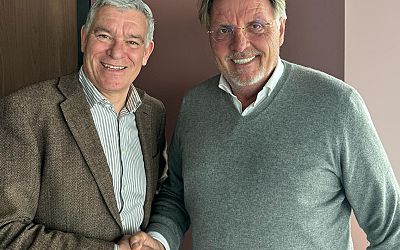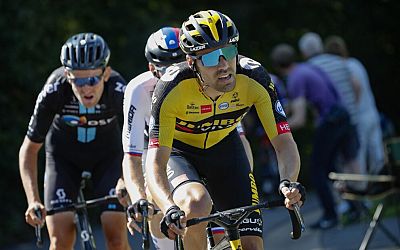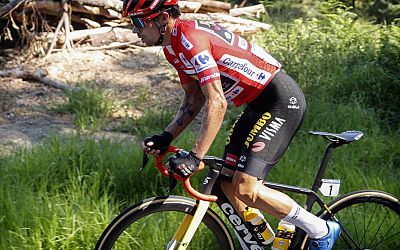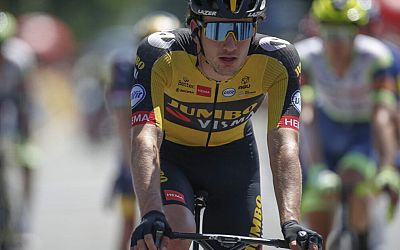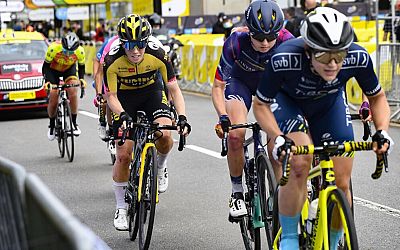Interview with GP Jasper de Wit about hygiene in the medical sector.
Jasper de Wit has been working as a general practitioner for 15 years and was previously active as a hospital doctor. He also owns the medical center Hoog Lede in Vlaardingen, which was founded about two years ago. Throughout his long career, he has never before experienced anything like the hectic situation of the past year and a half, and the busy period that he is now experiencing. Our colleague Daphne went to visit him at the medical center to ask how he looks back on this time, what has changed in terms of treatments and hygiene, and how he envisions the future in terms of new hygiene measures.

Last March, the pandemic came to the Netherlands and spread across the country like an oil slick. How was this time for you? Can you talk me through what it was like?
It was and still is a very intense time period for our practice. Last year, no one knew what the COVID-19 virus was, how contagious it was and for which groups of people it would be a threat. That is still the case today. We know how to prevent it, but not how to treat it properly. This resulted in a lot of uncertainty and panic among us and our patients. That is why we went big last year, in all of our ignorance, and set up several calamity locations to be able to separate the patient flow. In this way, patients with suspected Covid-19 did not come into contact with other patients. Unfortunately, we were experiencing a shortage of protective materials for the doctors. In fact, a number of my colleagues across the country have died from infection, which is terrible and makes the seriousness of the virus even clearer. I was therefore disappointed when we were told that we were not being given priority on the vaccine. We fought hard for this, all of the doctors hand in hand, and luckily we were vaccinated in February. But coming back to spring of 2020, patients with suspected COVID-19 were moved to separate, central locations. Unfortunately, these patients were very panicked, plagued by the images they had seen on TV from Italy; people being taken to the ICU, stuck lying in hospital beds on their bellies, not being able to see their family and dying alone. There was no middle ground. If you got infected, your last days would surely look like this.

How did you respond to this?
At the start, everyone was panicking. We even constructed emergency morgues at the calamity locations, which is an indicated of how panicked we were. But then I asked myself, how is this any different from our normal reality, really? We always deal with sick people, and people who unfortunately end up dying. The thing that made the difference, more than anything, was the wide-eyed looks of fear and uncertainty in our patients' eyes. This became clear to me even after my first mandatory Covid shift. Fully wrapped in a quarantine suit, I attended patients with serious and less serious complaints. During the treatments, I started to respond to patients' panicked state. I found that I could take away a large part of their fear just by saying: "Yes, you are sick, you have been infected, but you won't need to go to the ICU, and you probably won't even need to be hospitalised." This way, we were able to give them some small sense of reassurance and take away some of their fear.
Are there many patients who postponed their visit to the GP due to those fears?
In mid-February 2020, general practitioners started vaccinating at their practices. What was this like for you? What are the biggest differences in hygiene before Covid and now? Which hygiene products are essential in your practice? How important is hygiene to you? Which hygiene measures are permanent?
The main problem was that the government really screwed us over. We had just invited our patients and scheduled appointments, and then word started going around that the vaccine may be unsafe after all. Once again, total panic and ambiguity ruled among our patients. Our phones were ringing off the hook with people wanting to cancel their vaccination appointments. In the end, we heard from the government that Astrazeneca could be used after all. In addition, we were told that the two vaccines had to be spaced apart by 12 weeks. We had scheduled everything as efficiently as possible. Everyone had received their first invitation, and a second invitation 12 weeks later. Then it suddenly turned out that this was not necessary and the second vaccination could also be given earlier. This time would have been very intense in any case, but the government's fickle policy exacerbated this, and I think that's unjustifiable. It created unwarranted fear in people and influenced the vaccination rate. Neighborhoods with language deficiencies are now becoming a hotbed because there are many vaccination deficiencies there. This would have happened anyway, but due to the unclear communication from our government, the problem is bigger than it would have been otherwise.
We immediately made sure that all entries to our practice were equipped with disinfecting alcohol gel dispensers. We also had to pre-determine whether or not patients were suspected of having COVID-19. In case of a sore throat, fever or other complaints in line with COVID-19, patients were asked to go home and call us instead. In case of other complaints, the patients had to wait in the car and received a text message once they were allowed in for their appointment. The waiting rooms thus remained empty. Everyone cooperated well and thought it was a nice, safe way of going about things. We also wore a lot of protective equipment. It was very hot, stuffy and it felt very impersonal to be in gear like that while seeing patients who would share very personal information with us. I was very happy when all of that was over with. Hand washing is of course still an important part of our work, we use even more gloves than before, and we clean and disinfect surfaces and the like more often. For now, that will remain.
There is a disinfecting stand with hand alcohol at the door, and all counters and desks are equipped with hand alcohol gel. An efficient hand soap is also indispensable in our treatment rooms. But the products we use to clean and disinfect the furniture are also essential in our GP practice. We clean the furniture with water and cleaning agents and disinfect with alcohol-based disinfectant sprays.
Of course, this has always been important to me. During the training to become a doctor, we study microbiology. We know all about how essential good hygiene is and that bacteria are always present everywhere. Microbiology is something that is part of my work life every single day, when I perform a surgical operation. The moment you notice that a virus is more potent than what we are used to and that has the ability to mutate, you become a lot more alert. Looking back at complaint patterns and lung photos from December 2019, I have come to realize that the virus was probably already among us much earlier. We just didn't know it yet. This has made me much more alert when it comes to hygiene. I also take more time to think about whether or not it is a good idea to carry out house visits.
I assume that we will continue to wash and disinfect our hands well. Maybe not at every doorway, but it is becoming a lot more normal to carry disinfectant hand gel and to disinfect your hands every now and then. Of course, we will continue to clean our thoroughly, as always, and all contact elements are disinfected several times a day. I do hope that in time, I will be able to shake hands with my patients again, as that is such a nice personal way for me and my patient to greet one another. We always used to laugh when we saw tourists in Amsterdam wearing face masks, but it doesn't seem so crazy anymore. In Asia, people have dealt with pandemics more often, which is why they wear masks more often and are a lot more alert. We may also adopt this behavior. On the other hand, the Dutch people are a lot more down-to-earth, so it will be interesting to see what will happen.
The latest updates
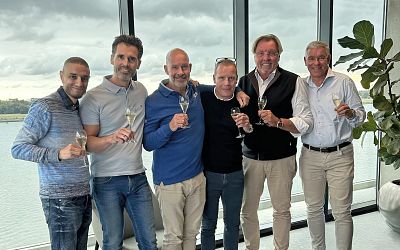
Dimensio Group joins forces with MTS Euro Products and Boso. The combination generates €300 million in revenue from hygiene and packaging solutions.
15-09-2025What does this mean in practice? For customers: access to a broader product range, from sustainable packaging to hygiene and cleaning products, supported by an international net...

Marcel van der Zwan new CEO MTS Euro Products B.V. | Founder/Majority shareholder Gerrit Malipaard takes advisory role
13-02-2025Gerrit Malipaard: ‘With Marcel, we deliberately brought in someone from our region. He was born in Maassluis and lives in Maasland. As a result, he knows Euro Products well,...
 NL
NL  EN
EN  DE
DE 